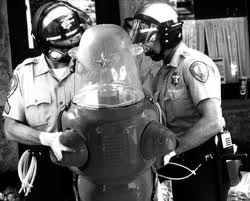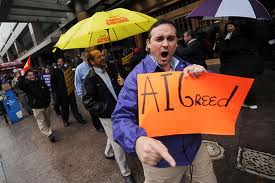I, Robosigner� A three act play about affidavit fraud in AG Masto�s Nevada
ACT ONE – The shot across all bank bows
As the month of August came to a close, Nevada’s attorney general, Catherine Masto, filed her second amended complaint against Bank of America and friends. Yves Smith provided the analysis in her post on Naked Capitalism, Nevada Lawsuit Shows Bank of America’s Criminal Incompetence, and all I can tell you is that it reads like a John Grisham or even a Robert Ludlum novel, I don’t know if it quite rises to the level of a John le Carre, but it’s a great read. Oh, and spoiler alert… there’s going to be a sequel.
She says that the litigation by the attorney general is “significant not merely due to the damages and remedies sought, but because it paves the way for private lawsuits.” So, that I like the sound of that… private lawsuits are good where Bank of America is concerned. Here’s what she had to say about the complaint itself…
And make no mistake about it, this filing is a doozy. It shows the Federal/state attorney general mortgage settlement effort to be a complete travesty. The claim describes, in considerable detail, how various Bank of America units engaged in misconduct in virtually every aspect of its residential mortgage business.
The complaint describes abuses from the very outset of the securitization process: how borrowers were mis-sold mortgages (it describes how entire products were effectively predatory), how investors were misled as to their quality, how they were not conveyed properly to securitization trusts, how borrowers were subject to abusive servicing (as in charged improper and impermissible fees), how promises made under the old consent decree regarding mortgage modifications were violated (for instance, even though interest rate reductions were promised, instead modifications often resulted in HIGHER interest rates), and the filing of fraudulent paperwork to execute foreclosures.
Metaphorically, this complaint was a shot across all the bank bows.
ACT TWO – A robo-felony is born
Next, on November 7, 2011, the Wall Street Journal, in its article titled: Nevada Foreclosure Filings Dry Up After ‘Robo-Signing’ Law, described a new felony law that Nevada’s state Assembly passed and that took effect on October 1, 2011, that’s designed to crack down on “robo-signing.” That’s what we call it when bank employees sign off hundreds of thousands of legal filings, lying about having personally reviewed each case.
The new law holds individuals criminally liable for such false representations and provides for civil penalties of $5,000 for each violation.
Early results say the law is working. In fact, during the first month after the law took effect, notices of default fell from 5,380 to just over 600, a drop of 88 percent, according to data tracked by ForeclosureRadar.com.
The new law also bans trustees from handling foreclosures if a subsidiary of the foreclosing bank, which means that Bank of America’s use of subsidiary, Recon Trust, in Nevada, is no longer allowed. And ReconTrust didn’t file any NODs in October, about which a Bank of America spokesliar declined to comment.
Of course, the banking lobby is going with the SOP, claiming that the law is going to slow foreclosures, which we all know, hurts everyone. And then I’m sure there was something about how there’s going to be no lending in Nevada in the future, and stuff like that.
Those behind the bill cleverly, if transparently, say that it’s not about stopping foreclosures, it about guarding against potential title defects that can lead judges to later invalidate foreclosures, as has happened in both Michigan and Massachusetts. Tisha Black Chernine, a real-estate lawyer in Las Vegas who helped draft the bill, was quoted by the WSJ as having said the following when talking about healing the housing markets…
“This is not at all about preventing foreclosures. It is about helping end users. We need to make sure foreclosures are done properly. People taking title pursuant to a bad foreclosure run the risk of having no title at all.”
Okay, so that her story and she’s sticking to it, I suppose. And if people are buying that, and it’s working with the bank, then I’m in favor of saying it. Heck, I’d tell BofA scary bedtime stories about all sorts of thing every night all year if I thought it would get them to do a Scrooge-like turnaround as far as the foreclosure crisis is concerned.
So, while Nevada’s NODs dropped by 88 percent, foreclosures picked in the other 49 states. Looking at loans bundled and sold as mortgage-backed securities without any government guarantees, Fitch ratings attributed the spike in foreclosures to making up for time lost pretending to investigate robo-signing, which started during the fall of 2010, and caused intermittent delays for several months.
ACT THREE – Let’s get criminal, criminal…
And now, for the first time, but likely not the last, … National Mortgage News is reporting that the State of Nevada filed its first criminal charges in conjunction with robo-signing against two individuals accused of filling tens of thousands of false documents. John Kelleher, the state’s chief deputy attorney general, told National Mortgage News that he expects that more indictments in the future.
The defendants in the case allegedly allowed others to forge their signatures and then submit the fraudulent documents to the county recorder, but curiously the indictment doesn’t say for which servicer Gary Trafford and Gerri Sheppard worked. Although, KLAS-TV in Las Vegas, after producing a lengthy series on robo-signing, reported that Trafford and Sheppard worked for Lender Processing Services (“LPS”) of Jacksonville, Florida.
If you want into the pool I’ve started it’s $25 per square, you can buy up to four, and the winner get’s half the pot, which is expected to be over $1 million, thanks to the use of leverage. The contest’s loser will also win a purse expected to be almost $2,000,000, due not only leverage, but also because of the incorporation of synthetic derivatives, and credit default swaps, which is sort of like “loser insurance.”
Bail has been set at $500,000 each, with the two defendants facing over 600 counts including both felonies and gross misdemeanors.
No allegations against the actual banks are included. Again, according to Kelleher…
“We simply don’t know if the major banks were aware of what these individuals were doing.”
Yeah, me either. It was probably a rogue employee of LPS, taking it upon themselves to forge and record hundreds of thousands of fraudulent affidavits on behalf of the largest banks in the world because… well, whatever. Regardless, I could certainly see why we might give LPS the benefit of the doubt, where there any doubt to be found anywhere near this case.
I’ll tell you the answer to this question: Yes the bank knew… all the way up to the CEO’s office they knew. No one would ever open a document forgery department at JPMorgan or Bank of America without the blessing of the bosses, you can trust me on that.
ACT FOUR – ???
Well, believe it or not, how this act goes is going to depend on “us.” Attorneys general, it should come as no surprise, are largely political beings… at least most are. That’s one of the major reasons that no settlement has been… or perhaps can ever be, reached. Kamala Harris in California has certainly been shone to be cognizant and reactive to public opinion.
In fact, the same thing is true about members of the House of Representatives. If you’re skeptical, just consider the issue that actually motivates people to action… executive bonuses… just about anywhere, like most recently at Fannie Mae and Freddie Mac. Hearings and held in a hurry, legislators ask tough questions and in many instances, things do happen.
For example, this week the House Financial Services Committee approved legislation to suspend executive compensation packages and halt future bonuses at Fannie and Freddie, only about a week since the news of the bonuses hit the headlines.
That’s not because those in congress all have a natural passion to deal with compensation issues, they most certainly do not. But, the American people have become visible and vocal on this issue and congress both sees and hears them loud and clear. And so things happen.
Remember a bill that was introduced right before the midterms in 2010 that would have made out of state notary okay? Well, Obama decided to pocket veto it with a day or two. It was here and then it was gone. Why? Because bloggers involved in the foreclosure fight all told their readers to write in now and enough did.
The fight over Elizabeth Warren is another example. The powers that be were united that Warren was not going to be the one to head up the Consumer Financial Protection Bureau, and eventually they prevailed, but it wasn’t easy… and that’s because of the pressure of public opinion.
We may not realize it soon enough and may not take action in time as a result, but the truth of the matter is that were “we the people” to push today, we’d likely find that someone is already kneeling down behind them and they fall easier than anyone thought they would. I’ve tried to say this before, but the answer lies in things like coordinated letter writing campaigns that are targeted, concentrated and laser focused as to their message.
Just imagine if 300,000 American voters all contacted their representatives in the House (i.e. targeted) at the same time (i.e. concentrated) and asked that congress take immediate action… let’s just say, to correct the country’s property records as a result of MERS… or more generally, to take immediate action to create jobs (i.e. focused). The media would, of course, cover it… and pollsters would be dispatched around the country to determine just how many people shared the view.
If enough people were involved, and by enough I mean that representatives receive at least hundreds of like messages from constituents. At 500 of such messages the resulting in them becoming concerned about their prospects for reelection, then things would happen.
I see the key obstacles today, at least as related to the foreclosure crisis, as being threefold:
- People are overwhelmed with their own lives and want an answer, but the game is one where you win by hitting singles, not home runs, and because the things that are singles aren’t as exciting as would be home runs… it is therefore hard to get enough people motivated to take action on something when that thing alone is not perceived as capable of solving someone’s problems today.
- People involved in the foreclosure crisis are ashamed of their situation and therefore they don’t tell anyone about their situation or share their views on the subject for fear of being branded “an irresponsible borrower.” As a result, the grass roots efforts haven’t spread from person to person, because although individuals join, they don’t recruit their friends or family members.
- Consider what’s missing from the foreclosure crisis. Even with over 3,000 evictions going on seven days a week, 365 days a year… and 10,000 foreclosure notices going out every day as well… do you see even one Hollywood movie or rock star on public service messages talking about the tragic nature of the foreclosure crisis? You don’t, do you? No you don’t. The “irresponsible borrower” stereotype, while changing slowly to be sure, continues to block progress and prevent people from learning more.
So, what happens in ACT FOUR is going to be a reflection of what we-the-people do… or don’t do. We cannot change what’s going on in a macro sense if we are exclusively focused on our individual micro situations. Individual fights do not win a battle, just as individually fought battles don’t win a war.
So, meanwhile… while we wait to see what’s behind the curtain that goes up on ACT FOUR… I give you Nevada’s Attorney General Catherine Masto!
… Faster than a NINJA loan originating at Wamu… More powerful than an unlimited warehouse line at Lehman Bros… able to see swaps and synthetics even when inside an SPE… Look, up in the sky… It’s a bird… It’s a plane… no it’s Nevada’s own, Catherine Masto… Super AG!
HEY WAIT… I HAVE AN IDEA!
My DOERS are used to writing letters and emails expressing frustration and anger to bankers who are doing things wrong and harming people. And they’re very effective letter writers. Well, now I’d like to suggest that we all send emails to Catherine Masto to tell her how pleased we all are to see her standing up for the people of her state and how we wish she was our AG too! I’m serious, if enough of us do it, the media might even pick up the story because NO ONE ever sends nice letters to state AGs… I’ll bet you anything.
SEND E-MAIL IN SUPPORT OF NEVADA’S AG – CLICK HERE.
Obviously, in California our AG has not yet come to realize that the fraud and forgery of robo-signing in this state is something worth going after, perhaps because it’s not as concentrated a problem as it is in Nevada. Harris hasn’t even talked about filing such a suit, as far as I can tell.
Frankly, I think we should do something about that obvious inequity. Or, we could just wait a few years until California’s housing market looks closer to what Nevada’s does today, and then everyone will speak up as they have in Nevada, believe you me.
Here’s how you reach California’s Attorney General Kamala Harris… call or send letter telling her that you want and very much expect her to prosecute servicers for the fraud that is “robo-signing,” just as her counterpart in Nevada is doing.
Contact California’s Attorney General
Attorney General’s Office
California Department of Justice
Attn: Public Inquiry Unit
P.O. Box 944255
Sacramento, CA 94244-2550
Voice: (916) 322-3360 or
Toll-free in California: (800) 952-5225
Fax: (916) 323-5341
###
AND JUST TO MAKE SURE YOU’RE NOT MISSING MY POINT…
It goes to show you… all you have to do is make the crime of affidavit fraud a felony, and it immediately stops 88 percent of foreclosures. What does that say about 88% of the past foreclosures in Nevada? I guess it says that they were dependent on fraudulently signed documents, right?
Looks like that to me… but then the bankers all said the robo-signings were just isolated incidents. Doesn’t seem right to me, in fact it looks to me as if foreclosing legally is the isolated incident.
I do know this for sure… we just need more like AG Masto… quite a few more.
Mandelman out.












